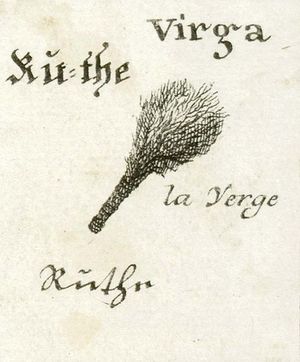Spare the rod and spoil the child
Spare the rod and spoil the child is a well-known English proverb. It means the notion that children will only flourish if punished, physically or otherwise, for any wrongdoing. Another modern interpretation of this proverb is "discipline is necessary for good upbringing".
Originally it referred to corporal punishment given with a rod (a single switch or a bundle of twigs used as a spanking implement), which usually meant a birch rod on the bare buttocks (see also birching).
The proverb is also often quoted in the shortened form Spare the rod.
Origins and early use
"Spare the rod and spoil the child" is often wrongly believed to be a Bible quote, but it is not. The proverb however may have been inspired by the following Bible quote (see also corporal punishment in the Bible):
He that spareth his rod hateth his son: but he that loveth him correcteth him betimes.
– Proverbs 13:24 (King James Version)
A variant of that is found in Aelfric's Homilies, circa 1000:
Se ye sparas his gyrde, he hatas his cild.
– Homilies (c. 1000)
Gyrde is girdle, i.e. belt. Other old findings of the proverb include the following from the late Middle Ages:
Qui parcit virge, odit filium
– Piers Plowman (1377) by William Langland
- which in English reads as Who-so spareth the sprynge (switch), spilleth (ruins) his children. (Virga is the Latin word for the birch rod.) The same Latin motto was chosen as the inscription for the school seal of Louth Grammar School in 1552 (see illustration to the right).
John Skelton's poetic work Magnyfycence, circa 1520, includes these lines:
There is nothynge that more dyspleaseth God
Than from theyr chyldren to spare the rod
Of correccyon (...)– Magnyfycence (c. 1520)
In 1560, Nice Wanton wrote: He that spareth the rod, the chyld doth hate (close to the biblical version), and in 1639, J. Clarke Parœmiologia Anglo-Latina quotes it as follows: Spare the rod and spoyle the child. About this time the phrase appears in the poem Hudibras by Samuel Butler (1612-1680), an English poet, satirist, painter, and philosopher:
Love is a boy by poets styl'd;
Then spare the rod, and spoil the child.– This is found in Part 2, Canto One of Hudibras.
See also
- Qui aime bien châtie bien
- Strafe muss sein
- Spare the Rod (book by Jane & James Ritchie)
Chat rooms • What links here • Copyright info • Contact information • Category:Root


